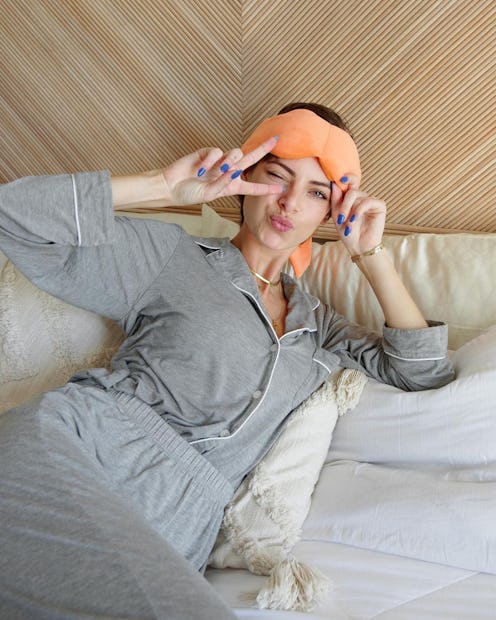(Health)
Can Weighted Eye Masks Help Ease The Anxiety That Keeps You Awake?
Experts weigh in — pun intended.

Like many, I’ve found that the past year has thrown my sleep schedule entirely off. While I used to have no trouble falling and staying asleep, I’m now staring at the ceiling at 2 a.m., quietly panicking over my hectic schedule or a horrifying news event. In my efforts to get better sleep, I’ve tried all sorts of supplements to help me relax. And while melatonin pills successfully knock me out, they’ve also led to some not-so-fun nightmares, which don’t keep me asleep. Desperate for another option, I turned to weighted eye masks, which are said to help with anxiety.
Read more: How To Use A Sleeping Mask For Clearer Skin In The Morning
Similar to traditional eye masks that block out light, weighted masks have the additional benefit of, well, weight. Thought to have a similar effect of a weighted blanket (but for your eyeballs), the idea is that the gentle pressure on the eyes and surrounding pressure points on the face can have a relaxing effect, stimulating the parasympathetic nervous system to calm the body and reduce the brain’s fight or flight response while raising levels of serotonin and melatonin that help you fall asleep faster.
But whether or not they actually work hasn’t necessarily been proven in clinical studies. Even so, some experts believe they may have a positive effect on those whose anxiety prevents them from both falling asleep and staying asleep. “Weighted eye masks with evenly distributed pressure can feel like a hug or being tightly wrapped in a blanket, which has an immediate relaxing effect on the body,” says Dr. Smita Patel, founder of iNeuro Institute who is triple board-certified in neurology, sleep medicine, and integrative medicine. “Studies have proven that weighted blankets can help with anxiety and mood, and weighted eye masks may help with anxiety and mood as well — however, more research is still needed regarding which specific conditions it can help with.”
While Patel is hopeful that they can help, not all agree that they’re necessarily equivalent to the anti-anxiety benefits of their blanket counterparts. “If I had to guess, I cannot imagine they would have the same level of effectiveness as a full torso weighted blanket,” says Dr. Michael Breus, clinical psychologist and sleep specialist. However, he does agree that any mask that blocks light — weighted or not — can be helpful in terms of getting better sleep. “Light is the single biggest factor when it comes to melatonin production,” he says. “When full spectrum light hits your eye, it stops melatonin production quickly. Melatonin is kind of like the key that starts the engine for sleep; we need it to begin the process. Total darkness helps a lot.”
Curious to see for myself — and also desperate for anything that would stop me from tossing and turning until the early hours of the morning — I took Slept’s Satin Weighted Eye mask No. 1 for a spin over the course of two weeks and, needless to say, I was pretty impressed. Traditional masks have helped me stay asleep (so long as they didn’t slip or fall off while I slept), but they’ve never successfully stopped my brain from running wild as soon as I crawled under the covers. However, I found the gentle weight and pressure to be relaxing and helped ease my racing thoughts, and for the first time in a long time, I was fast asleep before midnight.
Was it a placebo effect? Maybe so, but my much less tired self certainly isn’t complaining. I’ll forever be indebted to the topical caffeine products and ice rollers that have helped me fake a well-rested look over the past year, but I much more prefer getting actual sleep.
It’s important to keep in mind that even though weighted masks have the potential to help you sleep better, they shouldn’t be thought of as a replacement for prescription options — and if you’re really struggling, you should always seek the help of a professional. “I do believe that a weighted sleep mask can be an effective adjunct therapy for primary and secondary insomnia, but not as a replacement for prescribed therapy,” says Patel. Still, there’s a reason they’re growing in popularity. “Although they may not have been tested in clinical trials on people struggling with psychological or sleep disorders, more and more studies and evidence support the act that many people find them very effective and helpful.”
At the end of the day, weighted eye masks certainly aren’t a magic cure-all — at least they haven’t yet been proven to be — but if you, like me, find that anxiety and the inability to relax are keeping you up at night, they’re definitely worth a shot.
Below, six eye masks of all weights and price points to help you get a more restful night’s sleep.
We only include products that have been independently selected by TZRs editorial team. However, we may receive a portion of sales if you purchase a product through a link in this article.